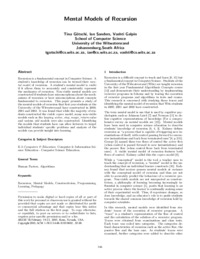Mental models of recursionTina Götschi, Ian D. Sanders, Vashti Galpin
Publikationsdatum:
Zu finden in: SIGCSE 2003 (Seite 346 bis 350), 2003
|
 |
 Diese Seite wurde seit 3 Jahren inhaltlich nicht mehr aktualisiert.
Unter Umständen ist sie nicht mehr aktuell.
Diese Seite wurde seit 3 Jahren inhaltlich nicht mehr aktualisiert.
Unter Umständen ist sie nicht mehr aktuell.
 Zusammenfassungen
Zusammenfassungen
Recursion is a fundamental concept in Computer Science. A student's knowledge of recursion can be termed their mental model of recursion. A student's mental model is viable if it allows them to accurately and consistently represent the mechanics of recursion. Non-viable mental models are constructed if students have misconceptions about the mechanisms of recursion or have misconceptions about concepts fundamental to recursion. This paper presents a study of the mental models of recursion that first year students at the University of the Witwatersrand have constructed in 2000, 2001 and 2002. It was found that while the majority of students constructed the viable copies model, many non-viable models such as the looping, active, step, magic, return-value and various odd models were also constructed. Identifying the models that students have can allow lecturers to target individual students' specific problems and analysis of the models can provide insight into learning.
Von Tina Götschi, Ian D. Sanders, Vashti Galpin im Konferenz-Band SIGCSE 2003 im Text Mental models of recursion (2003)  Dieses Konferenz-Paper erwähnt ...
Dieses Konferenz-Paper erwähnt ...
 Personen KB IB clear | Mordechai Ben-Ari , Elliot Soloway , Jim Spohrer | ||||||||||||||||||
 Begriffe KB IB clear | Fehlvorstellungen / misconceptions
, Fehlvorstellungen beim Programmieren
, Fehlvorstellungen bezüglich Rekursion
, Informatikcomputer science
, Informatik-Didaktikdidactics of computer science
, Informatik-Unterricht (Fachinformatik)Computer Science Education
,  Programmieren Programmieren programming
, Programmierkonzepteprogramming concepts
, Rekursionrecursion programming
, Programmierkonzepteprogramming concepts
, Rekursionrecursion
| ||||||||||||||||||
 Bücher |
| ||||||||||||||||||
 Texte |
|
 Dieses Konferenz-Paper erwähnt vermutlich nicht ...
Dieses Konferenz-Paper erwähnt vermutlich nicht ... 
 Nicht erwähnte Begriffe | Fehlvorstellungen bezüglich Initialisierung, Fehlvorstellungen bezüglich Schleifen, Fehlvorstellungen bezüglich Variablen, Informatikunterricht in der Schule |
 Tagcloud
Tagcloud
 Zitationsgraph
Zitationsgraph
 Zitationsgraph (Beta-Test mit vis.js)
Zitationsgraph (Beta-Test mit vis.js)
 4 Erwähnungen
4 Erwähnungen 
- Intuitive Modelle der Informatik (Michael Weigend) (2007)


- Computer Science Education 1/2011 (2011)
- Investigating and improving the models of programming concepts held by novice programmers (Linxiao Ma, John D. Ferguson, Marc Roper, Murray Wood) (2011)


- Investigating and improving the models of programming concepts held by novice programmers (Linxiao Ma, John D. Ferguson, Marc Roper, Murray Wood) (2011)
- Visual Program Simulation in Introductory Programming Education (Juha Sorva) (2012)


- WiPSCE '20 - Workshop in Primary and Secondary Computing Education, Virtual Event, Germany, October 28-30, 2020 (Torsten Brinda, Michal Armoni) (2020)
- High-school students' mastery of basic flow-control constructs through the lens of reversibility (Claudio Mirolo, Cruz Izu, Emanuele Scapin) (2020)


- High-school students' mastery of basic flow-control constructs through the lens of reversibility (Claudio Mirolo, Cruz Izu, Emanuele Scapin) (2020)
 Anderswo finden
Anderswo finden
 Volltext dieses Dokuments
Volltext dieses Dokuments
 |  Mental models of recursion: Fulltext at the ACM Digital Library ( Mental models of recursion: Fulltext at the ACM Digital Library ( : :  , 94 kByte; , 94 kByte;  : :  2021-03-21) 2021-03-21) |
 Anderswo suchen
Anderswo suchen 
 Beat und dieses Konferenz-Paper
Beat und dieses Konferenz-Paper
Beat hat Dieses Konferenz-Paper während seiner Zeit am Institut für Medien und Schule (IMS) ins Biblionetz aufgenommen. Beat besitzt kein physisches, aber ein digitales Exemplar. Eine digitale Version ist auf dem Internet verfügbar (s.o.). Es gibt bisher nur wenige Objekte im Biblionetz, die dieses Werk zitieren.











 Biblionetz-History
Biblionetz-History